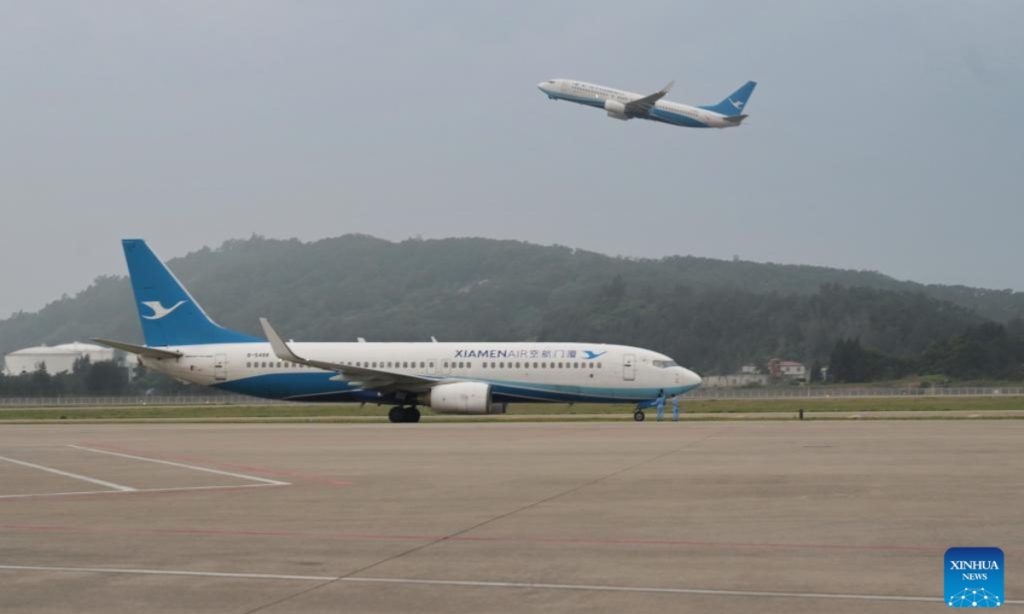Activation of M503’s connecting routes to benefit passengers across Straits

The M503 flight path's connecting routes of W122 and W123 from west to east have been activated starting Friday, a move that safeguards the rights and interests of passengers and is beneficial for people from both sides of the Taiwan Straits, spokesperson for the Taiwan Affairs Office under the State Council said on Friday.
The so-called security threat posed by the flight route alteration is, as always, a malicious hype by the Taiwan regional authorities to create an illusion that the mainland is "squeezing its space," which fundamentally serves the Democratic Progressive Party (DPP)'s own selfish scheme at the cost of the interests of its people.
The Civil Aviation Administration of China (CAAC) made the announcement early Friday. It also said that the airspace for arrivals and departures at Fuzhou Changle Airport in East China's Fujian Province will be further optimized starting from May 16.
The eastbound W122 and W123 link M503 with the mainland cities of Fuzhou and Xiamen in Fujian, close to Taiwan's Kinmen and Matsu islands.
Zhu Fenglian, a spokesperson for the Taiwan Affairs Office, said the decision is aimed at relieving the pressure on the growth in flight numbers across the immediate regions, ensuring flight safety, reducing flight delays, and safeguarding the rights and interests of passengers, which benefits both sides of the Straits.
The M503 route is located within the Shanghai Flight Information Region, and the establishment and operation of this route is a routine task of the mainland's civil aviation airspace management, Zhu noted.
Since the cancellation of the flight offset measure for the M503 route, overall operation safety has been stable, effectively improving cross-Straits flight operations, and further facilitating personnel exchanges between the two sides, the spokesperson added.
"The air route modification is fully compliant with international civil aviation regulations, aimed at alleviating airspace congestion. It is not only beneficial for personnel exchanges between the mainland and Taiwan, but also facilitates the smooth and safe passage of international flights," Ni Yongjie, director of the Shanghai Institute of Taiwan Studies, told the Global Times on Friday.
Zhang Wensheng, deputy dean of the Taiwan Research Institute at Xiamen University, added that the changes can significantly reduce travel time, while allowing airlines to save costs.
However, the island's department for mainland affairs protested that such "unilateral activation" of the connecting routes would have a "great impact on the flight safety of Kinmen and Matsu," according to department spokesperson Chien Chih-hung.
Chien claimed that previous flights operated in a westward direction, and the eastbound flights would "affect Taiwan's existing air routes, raising great concerns about flight safety risks."
"It [The route] is not for fighter jets, so what kind of danger are we talking about? Civilian aircraft do not have attack capabilities, so where is the safety risk coming from?" Li Fei, a professor at the Taiwan Research Center at Xiamen University, shrugged off this "concern."
Li noted that as long as both sides act in good faith and remain in close communication, there is no need for concerns for flight safety.
DPP authorities have been hyping the move as "a deliberate attempt" by the mainland to use civil aviation as a cover for political, and possibly military intentions, aimed at altering the status quo in the Taiwan Straits, which poses a threat to Taiwan's airspace defense.
Ni rebutted the claim as "completely ungrounded," noting that the purpose of the hyping is to stir up cross-Straits relations, inciting hatred between the two sides, and further aligning with the US' strategy of containing China.
"Even if there were security threats, it would be the DPP authorities digging their own graves by promoting 'Taiwan independence,'" Ni added.
The analysts further added that this is the DPP's typical way to smear the normal and legitimate actions taken by the mainland, creating a narrative of the mainland "squeezing their space" in order to manipulate public opinion and gain sympathy and support from the West.
"The fact is however, it is always for the benefit of the DPP's own selfish schemes, rather than considering the interests of compatriots on both sides of the Straits and the actual interests of Taiwan," Ni noted.
The CAAC said on Wednesday that this optimization of airspace in Fujian and the adjustment of the M503's connecting routes will facilitate the development of air transport between the Yangtze River Delta region and the Guangdong-Hong Kong-Macao Greater Bay Area, as well as China's southeastern coastal regions.
It will improve operational conditions and ensure flight safety, while further enhance the capacity to cope with thunderstorm seasons, improve flight punctuality, and better serve passenger travel needs, according to the administration.
China announced on January 30 that starting from February 1, the deviation of the M503 flight route from north to south will be canceled, a change which the Taiwan authorities interpreted would see southbound aircraft flight paths above the Taiwan Straits come closer to Taiwan's self-claimed "median line," "flight information region," and "air defense identification zone."